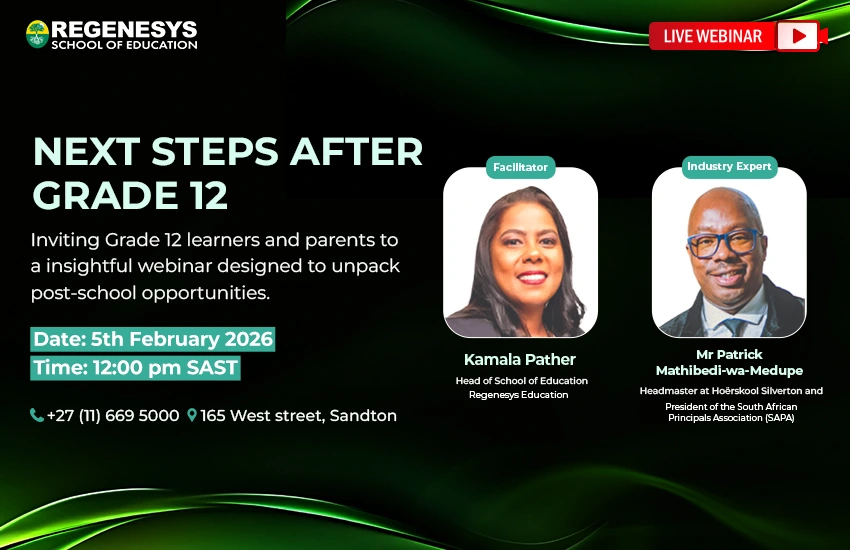Thinking about pursuing a Master of Business Administration in South Africa in 2025? One common question is whether the GMAT is a compulsory requirement. Many South African business schools now offer flexible admissions, meaning the GMAT is not compulsory for MBA in SA. Instead, alternatives such as internal assessments, the NMAT, or executive evaluations are widely accepted. The MBA GMAT requirement in South Africa now depends on school-specific rules, with many institutions offering waiver policies based on work experience or prior qualifications. Understanding the average GMAT score in SA, application costs, and GMAT alternatives can help you make an informed decision.
In this article, you’ll explore whether the GMAT is required for MBA 2025 in SA, available exemption options, admission alternatives like the NMAT and RPL, and what to expect from the Regenesys MBA October 2025 online intake.
Table of Contents
- Clearing the Confusion Around GMAT for South African MBAs
- Understanding Whether GMAT is Required for MBA 2025 in SA
- GMAT Exemption Policies for South African MBAs
- What is the Average GMAT Score in South Africa?
- Exploring Alternatives to the GMAT: NMAT, Internal Tests, and Executive Assessments
- GMAT Fees and Application Costs: What to Expect in 2025
- How Schools Determine Eligibility Without the GMAT?
- The Regenesys MBA Programme: A Career-Focused Pathway
- Is Work Experience Required for an MBA? October Intake Guidelines?
- Conclusion
- GMAT required for MBA 2025 in SA – FAQ

Clearing the Confusion Around GMAT for South African MBAs
Planning to pursue an MBA degree in South Africa in 2025? You’re likely wondering: is the GMAT compulsory for MBA SA applicants? The short answer is – not always.
While some business schools still regard the GMAT as a reliable way to measure academic preparedness, many institutions across South Africa follow school-specific rules. This means the GMAT required for MBA 2025 in SA depends on the programme’s focus and applicant profile. Schools increasingly value work experience, academic history, and leadership potential over standardised test scores.
For both South African and international applicants, it’s important to understand how different schools approach standardised testing and what alternatives may be available. The GMAT may no longer be the default route, especially for those with significant work experience or qualifications in related fields.
Whether you’re a recent graduate or a mid-career professional, understanding each school’s MBA GMAT requirement in South Africa will help you make the right decisions.
Explore MBA Programme in South Africa: Career, Fees & Skills here!
Understanding Whether GMAT is Required for MBA 2025 in SA
Many prospective students ask, “Is the GMAT required for MBA 2025 in SA?” The answer depends on the institution and the type of programme you are applying for. While some MBA programmes have historically included the GMAT as a mandatory requirement, the trend in South Africa is moving towards more holistic evaluation methods. As a result, many schools offer GMAT exemptions for South African MBA candidates through various waiver policies.
Instead of relying solely on standardised tests like the GMAT, many MBA programmes now consider professional experience, previous academic performance, internal assessments, and interviews as more effective tools for selecting candidates. This shift makes MBA studies more accessible to those who may not be test-ready but still demonstrate strong business acumen and leadership qualities.
GMAT Exemption Policies for South African MBAs
Exemption policies are increasingly being adopted by South African MBA institutions. These policies aim to offer flexibility to candidates who can demonstrate their competencies through alternative means, where no GMAT is required for MBA 2025 in SA.
Here are the typical exemption routes available:
1. Professional Work Experience
If you have several years of relevant work experience, especially in leadership or managerial roles, you may be exempted from writing the GMAT. Experience often speaks louder than test scores when it comes to evaluating real-world skills.
2. Relevant Academic Qualifications
Holding a recognised postgraduate qualification at NQF Level 8 or higher can also qualify you for a GMAT exemption. Institutions value the rigour of prior postgraduate study.
3. Internal Admission Tests
Many institutions now conduct their own assessments, making the GMAT required for MBA 2025 in SA unnecessary.
4. Recognition of Prior Learning (RPL)
For professionals with extensive business knowledge and skills, the RPL route allows for entry into MBA programmes without the GMAT. This pathway is ideal for experienced individuals who may not meet conventional academic requirements but can demonstrate practical expertise.
These exemption policies ensure that capable candidates are not excluded due to the lack of a test score.
What is the Average GMAT Score in South Africa?
While most schools say no GMAT is required for MBA 2025 in SA, understanding average performance helps gauge competitiveness. For South African applicants, recent GMAT data shows an average of about 526–543 for those applying to MBA and master’s programmes. Scores in this range provide a realistic benchmark – though stronger academic records or relevant experience can enhance your application even with a lower test result.
That said, if you aim to strengthen your application through a GMAT score, targeting the mid-500s and above would typically place you in a favourable position. The GMAT, however, should not be the sole focus of your MBA preparation, especially in South Africa, where more flexible admissions policies are common.
Exploring Alternatives to the GMAT: NMAT, Internal Tests, and Executive Assessments
Applicants who do not wish to write the GMAT or are unable to do so due to various constraints have several alternatives to consider. These alternatives allow for a fair evaluation of a candidate’s capabilities without the pressure of a standardised test.
Here are some widely accepted GMAT alternatives:
1. NMAT (Narsee Monjee Management Aptitude Test)
This test is considered easier to prepare for and less time-consuming than the GMAT. Some South African MBA programmes accept NMAT scores as an alternative.
2. Internal Admission Assessments
These are assessments developed and conducted by the business school itself. They often focus on logical reasoning, business case analysis, and communication skills. They are tailored to the institution’s curriculum and serve as a practical alternative to the GMAT.
3. Executive Assessments
These tests are specially designed for senior professionals who have significant work experience. They are shorter and focus more on real-world business problem-solving.
4. RPL Pathway
For experienced professionals, the Recognition of Prior Learning route allows candidates to enter an MBA programme and potentially complete it in a shorter time, such as one year instead of two.
These alternatives make MBA studies more accessible while still maintaining academic standards.

GMAT Fees and Application Costs: What to Expect in 2025
Preparing for and taking the GMAT can be a costly endeavour, which is why many applicants explore whether it is truly necessary. Understanding the financial commitment involved can help you make a more informed decision.
Here are some key cost considerations:
1. GMAT Exam Fee
The GMAT exam fee in South Africa is USD 275 for the test centre option and USD 300 for the online option.
2. Preparation Materials and Courses
Preparation materials for the GMAT can vary in cost, depending on the type of resource you choose – ranging from self-study tools and books to online platforms and guided courses.
3. Retake Costs
If you do not get the desired score, retaking the test involves an additional fee. This way, the GMAT required for MBA 2025 in the SA route can become expensive.
Because of these high costs, many applicants are relieved to find that the GMAT is not compulsory for MBA SA programmes. Instead, internal assessments or alternative pathways like NMAT or executive assessments are often more affordable.
Know MBA Programme Fees in South Africa: Full Breakdown here!

How Schools Determine Eligibility Without the GMAT?
When business schools clarify that no GMAT is required for MBA 2025 in SA, they assess candidates through a comprehensive evaluation process. This ensures that applicants are still vetted thoroughly even without a standardised test score.
Here are some of the key criteria used:
1. Academic Transcripts
Schools look at your performance in your undergraduate and postgraduate studies. Strong academic results can compensate for the absence of a GMAT score.
2. Professional Experience
Relevant job roles, especially those involving leadership, management, or strategy, are heavily weighed in the admissions process.
3. Admission Essays or Motivational Letters
These provide insight into your goals, motivation for pursuing an MBA, and personal strengths.
4. Interviews
One-on-one interviews allow schools to assess your communication skills, maturity, business understanding, and readiness for postgraduate study.
5. Internal Admission Tests
Some schools have proprietary assessments tailored to their programme’s focus and learning outcomes.
These methods ensure that schools admit candidates who are ready for the academic and professional challenges of an MBA, even without the GMAT.
The Regenesys MBA Programme: A Career-Focused Pathway
The Regenesys Master of Business Administration is a well-established and flexible programme designed for current and aspiring professionals across various sectors. Importantly, Regenesys does not require the GMAT. Instead, the programme uses the Regenesys Management Admission Test (RMAT) followed by a formal interview.
Here are the core highlights of the Regenesys MBA:
- Study Mode: Both contact and online formats are available. The October 2025 intake is exclusively online.
- SAQA ID: 97886
- NQF Level 9
- Credits: 230
- Duration: Two years for the standard route; one year for candidates admitted through the Recognition of Prior Learning (RPL) route.
- Admission Process: Includes form submission, document upload, application fee payment, RMAT test, and a final interview.
- RPL Route: Professionals with advanced business knowledge and leadership experience may be eligible for a shorter, one-year MBA track.
- Application Deadline: For the October 2025 intake, applications close on 29 September 2025.
This approach allows for a comprehensive evaluation of applicants without the need for a standardised test like the GMAT.
Is Work Experience Required for an MBA? October Intake Guidelines?
One of the most common queries from applicants is whether work experience is essential for an MBA, particularly for those applying for the October intake. While requirements may differ slightly across institutions, here is a general overview:
1. Minimum Experience
A minimum of 2-3 years of work experience is typically expected for full-time MBA applicants. However, executive or part-time programmes may require 5 or more years.
2. Regenesys Requirement
Regenesys expects relevant work experience. While there is no fixed duration mentioned, applicants are evaluated on the depth, relevance, and impact of their professional background.
3. RPL Consideration
Candidates applying through the RPL route must present compelling evidence of business expertise and strategic understanding, supported by documentation and interviews.
4. Contribution to Class
MBA programmes value the diverse insights that working professionals bring to classroom discussions, group projects, and case studies.
So yes, work experience is generally a key part of the admissions process, particularly for the October intake where programmes are designed to cater to working professionals.
Know MBA Return on Investment in South Africa: Is It Worth It in 2025? here

Conclusion
So, is the GMAT required for MBA 2025 in SA? In most cases, the answer is no. MBA programmes across the country have evolved to accommodate a broader range of applicants, focusing more on work experience, academic background, and leadership potential than on standardised test scores.
Alternative assessments such as internal evaluations and Recognition of Prior Learning (RPL) now offer flexible pathways for admission. The Regenesys MBA stands out as a strong choice for professionals looking for a GMAT-free, career-aligned learning experience.
Whether you’re a working professional looking to upskill, a senior manager formalising your credentials, or someone switching careers, there are many MBA options in South Africa that do not require the GMAT.
To apply for the Regenesys MBA October 2025 intake, eligible applicants can take the RMAT (Regenesys Management Admission Test) instead of the GMAT.
GMAT required for MBA 2025 in SA – FAQ
Is GMAT required for MBA 2025 in SA?
No. Many South African institutions do not follow a strict “GMAT required for MBA 2025 in SA” rule and offer flexible admissions.
Can I apply for an MBA without a GMAT score?
Yes. You can apply through internal assessments, work experience evaluations, or tests like the NMAT.
What are some alternatives to the GMAT?
Options include internal admission tests, executive test acceptance, NMAT alternative, and RPL pathways.
What is the average GMAT score in South Africa?
The average GMAT score in SA ranges between 550 and 600 for those who choose to submit it.
Does Regenesys require the GMAT for its MBA?
No. Regenesys requires candidates to take the RMAT and complete an interview instead.
Is work experience necessary to apply for an MBA in South Africa?
Yes. Most programmes, including Regenesys, require applicants to have relevant professional experience.
What is the deadline for the October 2025 intake at Regenesys?
The deadline to register is 29 September 2025.







